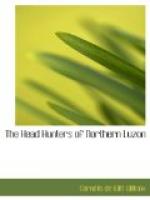VIII.
To conclude, and in part to repeat: when we took over the Philippines, we unquestionally at the same time acquired a burden. Of this burden we can rid ourselves by setting the Islands adrift; or we can declare that we intend to keep the Islands, as we have kept Porto Rico. In the light of the argument hereinbefore submitted, which of these courses appeals to the people of the United States? May we, or may we not, without incurring an accusation of injustice to a dependent population, honestly ask ourselves if actual conditions should not sometimes limit or control the application of an abstract principle? Does our duty in the premises consist or not in merely satisfying such a principle? Is it or is it not possible that practical considerations—and what is practical is not always sordid—may outweigh an abstraction? Is it or is it not conceivably our duty to use our superior knowledge, power and experience to the best advantage of those chiefly concerned, even if these should apparently for a time not agree with us in the application we purpose to make of our knowledge, power, and experience?
NOTES
[1] See Retana’s edition, p. 183, Madrid, 1909.
[2] It is interesting to note that as late as 1889 General Weyler, then Governor-General of the Archipelago, in establishing various comandancias, drew up regulations for the treatment of the natives, etc., as remarkable for lenity and good sense as his later measures in Cuba were, whether justly or not, distinguished for severity.
[3] For an account of the early missions of this order, see the Manila Libertas of May 23, 1910.
[4] Report of the Secretary of the Interior, Philippine Islands, 1910; Washington Government Printing Office, 1911.
[5] See “Census of the Philippine Islands,” Vol. I., p. 453 et seq., for a discussion of the non-Christian tribes.
[6] Vol. I., p. 60 et seq.
[7] Mr. A.H. Savage Landor, in his “Gems of the East,” protests against our practice of boiling water before drinking it, but the experience of others is against him. He was simply fortunate in not being made ill by the natural water.
[8] An attempt has been made to stock this river with trout, but it has proved a failure. The fish grew and throve, but did not breed.
[9] This happened on a large scale in the spring, of this year (1912). Landslides having occurred on both banks of the canon, and as luck would have it, at the same point, the waters rose behind the natural dam thus formed to a height of over one hundred feet, and breaking through, scoured the valley in their sweep, completely wiping out the road.
[10] For a fuller account of Padre Villaverde’s labors, see the Manila Libertas of May 17, 1910. Villaverde remained at his post until his health broke completely; he set out for Spain, but never reached it, dying August 4, 1897, and being buried at sea a few hours only from Barcelona. The great trail he built reduced the cost of transportation by nine-tenths.




